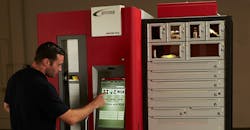Smart Vending Delivers Accountability and Prevents Downtime
It was two millennia ago that Greek engineer Hero of Alexandria invented the first vending machine, a series of mechanisms activated by a Roman coin to dispense a controlled amount of holy water. Even back then, you couldn’t trust the honor system.
The vending industry has progressed prodigiously since then, dispensing everything from candy bars to soft drinks to even crazier things in Japan, such as hats for cats. And it was a trip to Japan by a disciple of Lean manufacturing, Kent Savage, that inspired the very first industrial vending machine, which doled out manufacturing tools for Ford plants, in 1989. These parts are a heck of a lot more costly than holy water, and the trickle of lost or misplaced supplies adds up over time to wash away profits.
Matt Schron, general manager at Jergens Industrial Supply (JIS), says insufficient inventory control can cost companies millions of dollars by spending on parts that never get used.
"To me, every shop has the same degree of that going on, whether it's a $5 million or $10 million shop," says Schron, whose great-grandfather and grandfather founded the Cleveland-based Jergens, Inc. to make airplane seat components during World War II. The company branched out to distribution 50 years ago when companies asked if they would also sell them drills and other tools along with manufactured parts.
"We have always been on the cusp of technology and innovation and I want to keep it that way," Schron says.
For the last decade, they have stayed competitive by providing customer facilities with AutoCrib industrial vending machines— free of charge. The result is a 30% increase in productivity, according to JIS. These smart vending machines, including the RoboCrib VX1000 and newer TX750, hold anything from power tools to tiny circular inserts, and its consignment inventory, so the user doesn't spend until they vend.
Access to each item can be controlled via specific login, badge scan or even fingerprint to open up, tailored specifically for each user's role or specific application for the day. That can prevent a machinist from using the wrong tool or material which can damage a part of the machine. The TX750 can also store up to 987 items and limits can be set so a department does not go over budget or a worker doesn't overuse items.
"Hoarding happens," Schron says."A worker may take a pack of 10 inserts, throw it in a box and forget about it."
This can add up as packs of small carbide drill inserts can cost $45.
By syncing up to the customer and supplier's ERP allows for real-time part tracking and worker accountability.
"You know who took it out, you have tracking and tracing of what job it went to," Schron explains.
If it's a reusable item, like a metrology gage, is missing at the end of the shift, you know exactly who took it.
Theoretically, this automated honor system benefits the worker, too—unless they are like Johnny Cash trying to build their own car "one piece at a time" on the company dime. Instead of searching each station for that special piece of equipment, or walking what could be hundreds so yards to the supply room, everything they need can be centrally located.
Always Available
The user can set a threshold for how many units must be in stock at the site, and the daily report sent to JIS will allow the distributor to keep the machine shop or manufacturer adequately supplied. This prevents availability from being the source of any downtime.
"Most facilities usually have run rates of $150-200 per hour," Schron says. "You could have a $10 insert or drill you're looking for, and it's not in your facility that could cause you to lose your production rates."
The bigger the job, the more vital availability of even the smallest tool becomes.
"That $10 drill can impact them sending a $100,000 part," Schron says.
Driven by Data
Schron also believes the automated machines, serving as both onsite point of service and interface to the Industrial Internet of Things, were a major reason JIS grew by 500% between 2010 and 2015. JIS has about 120 of these machines at facilities scattered across the Midwest, which are now connected to its Epicor's Prophet 21 distribution cloud-based ERP.
The advanced cloud solution allows JIS to integrate to the AutoCrib machines via ODBC drivers, which standardize communication from applications to database management systems via SQL. In human speak, it lets the supplier import relevant data easier.
"I'm a big believer that our team opens two programs in the morning: Prophet 21 and Outlook," Schron says. "We need to drive all of our data and accountability through these two applications."
This lets JIS dive deeper into the data from daily reports than ever before to not only predict what a customer will need and when, but if something is out of the ordinary.
This goes well beyond parts usage and acts as a biometric monitor for the entire plant. For example, if there's a spike in disposable hearing protection usage in a certain department, the environmental safety manager might want to investigate if how to mitigate that risk.
"We know they [typically] use ten in a month, now they used ten in a day," Schron says. "We can ask, 'Why is it changing and what do we need to address?'"
About the Author
John Hitch
Editor, Fleet Maintenance
John Hitch, based out of Cleveland, Ohio, is the editor of Fleet Maintenance, a B2B magazine that addresses the service needs for all commercial vehicle makes and models (Classes 1-8), ranging from shop management strategies to the latest tools to enhance uptime.
He previously wrote about equipment and fleet operations and management for FleetOwner, and prior to that, manufacturing and advanced technology for IndustryWeek and New Equipment Digest. He is an award-winning journalist and former sonar technician aboard a nuclear-powered submarine where he served honorably aboard the fast-attack submarine USS Oklahoma City (SSN-723).


